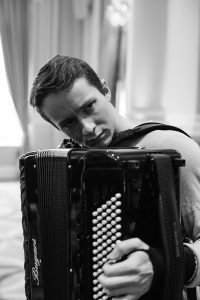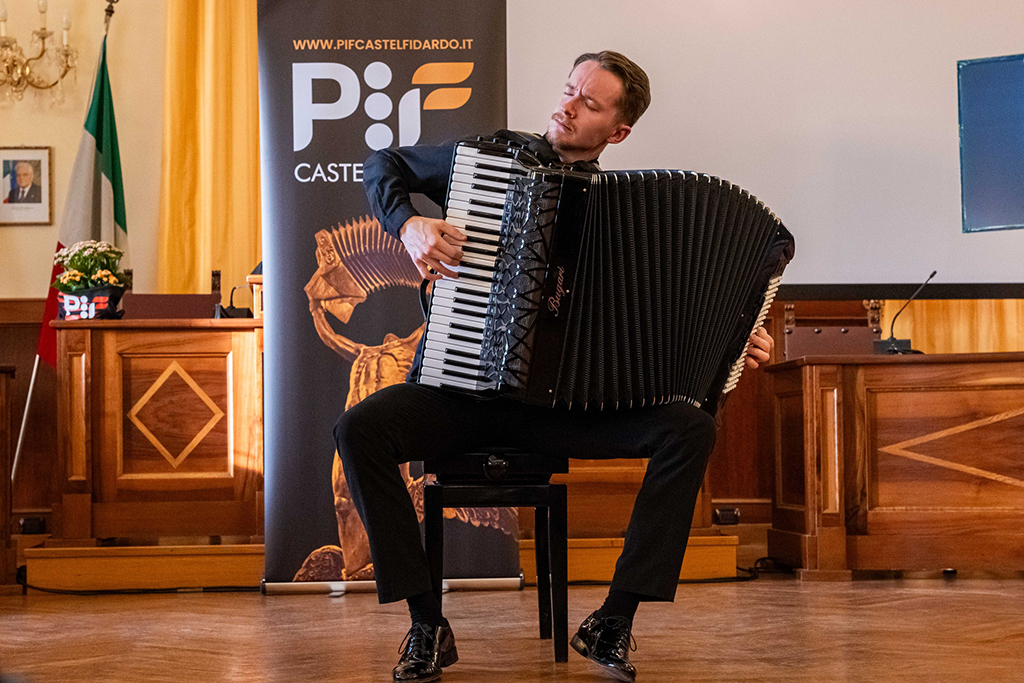L’amore per la fisarmonica grazie alla nonna
L’importanza di una figura centrale come sua nonna per Ryan Corbett
 Fisarmonicista che spazia con naturalezza dalla musica popolare scozzese a quella colta, Ryan Corbett è un giovane e luminoso talento del suo strumento. Anche fine arrangiatore, il musicista scozzese racconta le tante esperienze vissute che partono dagli albori della sua carriera fino ad alcune tappe particolarmente significative che hanno lasciato un’impronta importante nel suo proficuo percorso artistico.
Fisarmonicista che spazia con naturalezza dalla musica popolare scozzese a quella colta, Ryan Corbett è un giovane e luminoso talento del suo strumento. Anche fine arrangiatore, il musicista scozzese racconta le tante esperienze vissute che partono dagli albori della sua carriera fino ad alcune tappe particolarmente significative che hanno lasciato un’impronta importante nel suo proficuo percorso artistico.
All’età di undici anni tua nonna ti ha regalato una fisarmonica con cui hai imparato a suonare la musica tradizionale scozzese. Grazie a lei ti sei innamorato perdutamente di questo strumento?
Sì, è grazie a lei. All’epoca ricevevo lezioni di pianoforte e violino, ma non avevo un insegnante di fisarmonica. Per questo motivo suonare l’accordion non era un’esercitazione, ma semplicemente un divertimento. Mi sono innamorato della musica tradizionale e della fisarmonica allo stesso tempo. Quella classica è arrivata più tardi, quando ho iniziato a studiare con Djordje Gajic a quattordici anni.
Hai vinto diverse competizioni internazionali in giro per il mondo. Secondo te, quali sono le qualità artistiche che i giudici dei concorsi hanno maggiormente apprezzato?
È importante essere tecnicamente preparati e sicuri, in modo tale da eseguire ed interpretare la musica stilisticamente e timbricamente nel modo corretto, oltre a far sì che la performance possa essere percepita in modo profondo da chi ascolta. Ma non esiste una formula. Ai giudici a volte piace, a volte no.
Hai eseguito il tuo arrangiamento di Rameau per trio di fisarmoniche alla presenza del Re Carlo III durante la sua visita ufficiale al Conservatorio Reale di Scozia e, successivamente, sei stato invitato a esibirti in “Solo” con un arrangiamento di una melodia scozzese alla cerimonia d’onore del Re di Scozia nella cattedrale di St Giles. Questo evento è stato trasmesso in diretta su BBC One e BBC Radio 3. Interiormente, come hai vissuto un’esperienza artistica così importante?
Per l’occasione avevo proposto musica di Bach, invece il Re ha voluto musica scozzese. Io non suono spesso il folk della Scozia, quindi ci è voluto del tempo per decidere cosa suonare. Alla fine ho creato un arrangiamento di un’aria lenta scozzese che utilizza l’armonia della musica d’organo di Bach. L’ho preparato solo pochi giorni prima dell’evento, quindi è stato un po’ snervante esibirsi per milioni di telespettatori.
Ti sei esibito in tutto il mondo tra Germania, Stati Uniti, Inghilterra, oltre all’esperienza da solista con la BBC Symphony Orchestra e la National Youth Orchestra of Scotland. Dal pubblico di questi Paesi in cui hai suonato, hai notato somiglianze e differenze riguardo all’attenzione all’ascolto e alla partecipazione emotiva durante i concerti?
In base alla mia esperienza credo che dipenda più dalla singola persona che dal Paese o dalla cultura. Alcuni ascoltatori, durante i concerti, manifestano la passione per la musica con un entusiasmo più evidente, più visibile, altri lo fanno ma in modo più riservato, più intimo.
 Nel 2021 hai formato un duo di fisarmoniche con Djordje Gajic. Il repertorio prevede un arrangiamento del balletto di Stravinskij Petrushka e il tuo arrangiamento del Preludio e Fuga in mi bemolle Sant’Anna di Bach che è stato descritto come «musicalmente “unificato” e assolutamente avvincente» da Seen and Heard International. Dal punto di vista timbrico, tecnico e interpretativo, quali sono le principali caratteristiche di questo duo?
Nel 2021 hai formato un duo di fisarmoniche con Djordje Gajic. Il repertorio prevede un arrangiamento del balletto di Stravinskij Petrushka e il tuo arrangiamento del Preludio e Fuga in mi bemolle Sant’Anna di Bach che è stato descritto come «musicalmente “unificato” e assolutamente avvincente» da Seen and Heard International. Dal punto di vista timbrico, tecnico e interpretativo, quali sono le principali caratteristiche di questo duo?
A volte suoniamo come se fossimo una sola persona, altre volte proprio come un duo: è una formazione versatile. Djordje Gajic è un musicista eccezionale – e sebbene io abbia studiato con lui per dieci anni – abbiamo personalità musicali diverse che sembrano funzionare bene insieme. Ho arrangiato Bach, ma per Petrushka abbiamo preso il quartetto per pianoforte di Stravinskij “Hand Version” e arrangiato le nostre parti aggiungendo alcune cose dalla partitura orchestrale.
In studio di registrazione e dal vivo, che modello di fisarmonica utilizzi?
Bugari Bayan Spectrum Piano.
Quali sono i tuoi impegni artistici da qui ai prossimi mesi?
Ho registrato il Concerto delle Fiabe di Vaclav Trojan con la BBC Symphony Orchestra. Nei prossimi mesi ho due concerti con cantanti, uno con un violinista, con un pianista e alcuni concerti da solista. Sto imparando un nuovo repertorio per presentare in anteprima un concerto per fisarmonica all’inizio del prossimo anno.
————————————————————————————
The love for the accordion thanks to grandmother
The importance of a central figure like his grandmother for Ryan Corbett
 Accordionist who naturally ranges from Scottish folk music to classical music, Ryan Corbett is a bright young talent on his instrument. Also, a fine arranger, the Scottish musician recounts the many experiences he has had that start from the beginning of his career up to some particularly significant stages that have left an important imprint on his fruitful artistic journey.
Accordionist who naturally ranges from Scottish folk music to classical music, Ryan Corbett is a bright young talent on his instrument. Also, a fine arranger, the Scottish musician recounts the many experiences he has had that start from the beginning of his career up to some particularly significant stages that have left an important imprint on his fruitful artistic journey.
At the age of eleven your grandmother gave you an accordion with which you learned to play traditional Scottish music. Thanks to her, have you fallen madly in love with this instrument?
Yes, it’s thanks to her. At the time I was receiving piano and violin lessons, but I didn’t have an accordion teacher. For this reason, playing the accordion was not an exercise, but simply fun. I fell in love with traditional music and the accordion at the same time. The classical one came later, when I started studying with Djordje Gajic at fourteen.
You have won several international competitions around the world. In your opinion, what are the artistic qualities that the competitions judges appreciated most?
It is important to be technically prepared and confident, in order to perform and interpret the music stylistically and tonally in the correct way, as well as ensuring that the performance can be perceived deeply by the listener. But there is no formula. Sometimes judges like it, sometimes they don’t.
You performed your arrangement of Rameau for accordion trio in the presence of King Charles III during his official visit to the Royal Conservatory of Scotland and, subsequently, you were invited to perform “Solo” with an arrangement of a Scottish melody at the ceremony of honor of the King of Scots in St Giles Cathedral. This event was broadcast live on BBC One and BBC Radio 3. Internally, how did you have such an important artistic experience?
For the occasion I had proposed music by Bach, but instead the King wanted Scottish music. I don’t often play Scottish folk, so it took some time to decide what to play. I ended up creating an arrangement of a slow Scottish air that uses the harmony of Bach’s organ music. I only prepared it a few days before the event, so it was a bit nerve-wracking to perform for millions of viewers on TV.
You have performed all over the world including Germany, the United States, England, as well as “Solo” experience with the BBC Symphony Orchestra and the National Youth Orchestra of Scotland. From the audiences of these countries where you played, have you noticed similarities and differences regarding attention to listening and emotional participation during concerts?
Based on my experience, I believe that it depends more on the individual personnel than on the country or culture. Some listeners, during concerts, demonstrate their passion for music with a more evident, more visible enthusiasm, others do so but in a more reserved, more intimate way.
 In 2021 you formed an accordion duo with Djordje Gajic. The repertoire includes an arrangement of Stravinsky’s ballet Petrushka and your arrangement of Bach’s St. Anne Prelude and Fugue in E flat which has been described as “musically ‘unified’ and utterly compelling” by Seen and Heard International. From a timbral, technical and interpretative point of view, what are the main characteristics of this duo?
In 2021 you formed an accordion duo with Djordje Gajic. The repertoire includes an arrangement of Stravinsky’s ballet Petrushka and your arrangement of Bach’s St. Anne Prelude and Fugue in E flat which has been described as “musically ‘unified’ and utterly compelling” by Seen and Heard International. From a timbral, technical and interpretative point of view, what are the main characteristics of this duo?
Sometimes we play as if we were one person, other times just like a duo: it’s a versatile lineup. Djordje Gajic is an exceptional musician – and although I have studied with him for ten years – we have different musical personalities that seem to work well together. I arranged Bach, but for Petrushka we took Stravinsky’s piano quartet “Hand Version” and arranged our parts by adding some things from the orchestral score.
In the recording studio and live, what model of accordion do you use?
Bugari Bayan Spectrum Piano.
What are your artistic commitments between now and the next few months?
I recorded Vaclav Trojan’s Fairy Tale Concerto with the BBC Symphony Orchestra. In the next few months, I have two concerts with singers, one with a violinist, one with a pianist and some “Solo” concerts. I am learning new repertoire to premiere an accordion concert early next year.

